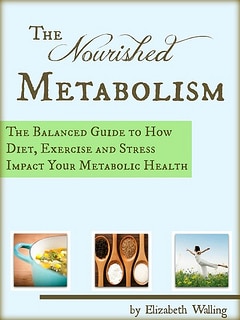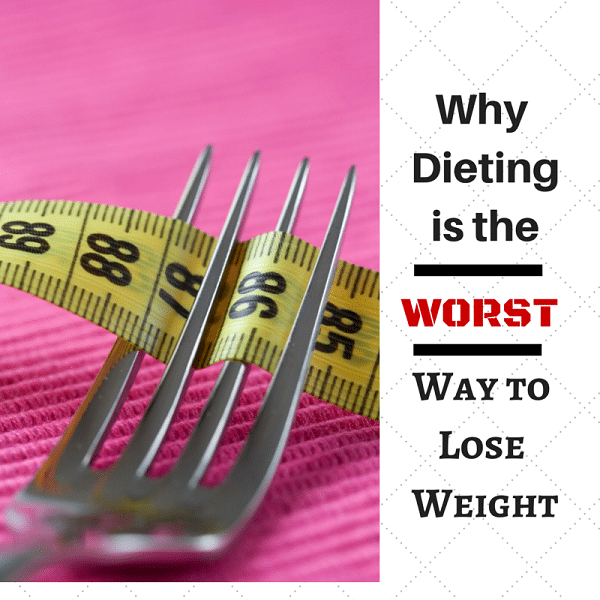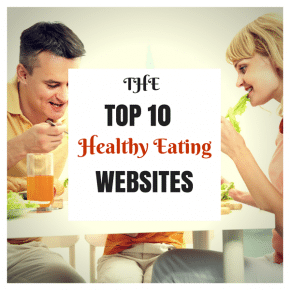Here’s why dieting is the worst way to lose weight:
I can guarantee that you’ve tried dieting at least once in your life. Who hasn’t?
But rare are the people who manage to lose weight, and more importantly – to lose weight and keep it “lost”.
Most of us try every new trendy diet plan, only to be disappointed again when the extra pounds refuse to evacuate.
The result is the yo-yo-dieting lifestyle. Frustrating, stressful, and self-esteem destroying.
Page Contents
Why Dieting Doesn’t Work For Anyone
Before I start my diet-slandering campaign, let’s define dieting:
Dieting is counting calories. Portion control. Weight watchers. Low-Carb diet. As I write this, I already feel like I’m in a war zone.
Any diet plan that requires obsessing over the “best” nutrition and obsessing over counting calories or weight watchers points – will end up doing more harm than good.
Here are 4 reasons why dieting is the worst way to lose weight:
1. Why Low-Calorie Anything Sucks
Your body is made to cope with a myriad of circumstances in very specific ways.
It’s constantly regulating temperature, acidity, energy conversion and a variety of other factors to make sure it’s functioning at the best it can at any given moment.
“Dieting is like dropping a bomb into this complex structure and hoping nothing will go wrong.
The most common bomb is low-calorie dieting–in its many, many forms–which embodies the idea that you can starve the fat off your body (either quickly or slowly).
The very premise of this theory is flawed, because your body is made to fight against starvation by down-regulating your metabolism.
It’s your body’s regulatory response to cope with times when the food supply is restricted – Even when you’re the one restricting it.”
– Elizabeth Walling, The Nourished Metabolism
2. The Hidden Side Effect of “Dieting”
Your body is extremely sensitive to stress.
Any type of stress, including the stress that nobody is talking about – the sticking-to-my-diet-stress.
Restrictive dieting is stressful. And not just for an hour or two each day. It causes long-term chronic stress, relieved only when you give up and stop dieting.
Can you remember the last time you caved in and ate something “wrong”?
Oh the sweet surrender. A little piece of heaven (even for only a few seconds, until the guilt kicks in).
Sadly, one of the major side effects of stress (specifically stress hormones) is poor digestion and assimilation. And dieting causes stressed metabolism. You don’t want to stress-out your metabolism if weight loss is your goal, right?
3. How Dieting Frightens Your Body
With a very limited amount (and variety!) of food coming in, your body “feels” starved” and starts panicking.
“The body gets choosy with how it’s spending energy. Regulating moods, for instance, might take a low priority because feeling happy and balanced isn’t as important as basic survival during a time of famine.
Mood problems, thinning hair, sleep disturbances, and skin problems are among the first to show up as the metabolism copes with dieting.”
– Elizabeth Walling, The Nourished Metabolism
Plus, when your body doesn’t have enough of the right food, it starts to breakdown muscle, bone and organ tissues to get what it needs. So you actually lose muscle before you lose one ounce of fat.
4. The Thyroid Connection
Thyroid health is the most important factor in a healthy metabolism. Frequent yo-yo-dieting, and simply not eating enough can seriously damage your thyroid.
Long term dieting reduces your metabolism by turning down thyroid function.
It’s Your Choice: Stress Your Metabolism or Nourish Your Metabolism
 All of the smart information in this post was found in Elizabeth Wailing’s “The Nourished Metabolism”.
All of the smart information in this post was found in Elizabeth Wailing’s “The Nourished Metabolism”.
Her fascinating book proved to me that the way I eat, sleep, exercise and think – Could all be working against my metabolism.
Elizabeth shows you how this can be easily reversed. You can change your habits and your nutrition to support and strengthen your metabolic health. Once you do that, the weight will come off without effort and more importantly – Without the torture of dieting.
What I love about Elizabeth’s book is that it involves no dieting, no restrictions, no frightening statistics and no…stress.
She shares clear and useful information to help find your own way to improve your metabolism and bring it back to its ideal state. The weight loss is the sweet side effect of healthy metabolism.
What about you? Are you planning to do something about your metabolism?
To your health and happiness,
Meital






Evelyn,
Thanks for your comment and for taking the time to read my post!:)
Hi Meital,
Chronic dieting does more harm to the body than just being on a “not diet” diet. I’d rather be free to eat a healthy, balanced diet than to be stressed about what to eat. Stress actually decreases our calorie burning capacity and many other things. I have experience with dieting and I never want to be stressed again about what to eat. These days, I happier and really enjoy the food that I eat.
Great post packed with lots of helpful information! Thanks for sharing your post with me.
Evelyn
I can (perhaps a little proudly) boast that I have never been on a diet!
I really appreciate this post. Every time a friend says they are on a diet, I cringe! So terrible for the body!